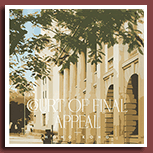Review of 2021

The Hon Mr Justice Andrew CHEUNG was sworn in as the Chief Justice of the Court of Final Appeal on 11 January 2021. At the Ceremonial Opening of the Legal Year on the same day, the Hon Chief Justice Andrew CHEUNG indicated that the Opening of the Legal Year was an important occasion for the Judiciary as well as the community, as it focused public attention on the administration of justice and the rule of law, and in particular the challenges we faced.
In his first Opening of the Legal Year as Chief Justice, he explained the three fundamentals that the Judiciary are committed to: first, the Judiciary must be and must remain an independent and impartial judiciary because an independent judiciary is essential to the rule of law in Hong Kong and the due administration of justice; second, the Judiciary must comprise judges who are upright and who are prepared to uphold rights because a judiciary can only be as good as the judges that man its courts; and lastly, the Judiciary must remain a professional and efficient judiciary that moves with the times.
The Hon Chief Justice Andrew CHEUNG remarked that independence did not mean a lack of accountability. Subject to the overriding consideration that there can be no undermining of judicial independence, he agreed that there was still room for further enhancement of the transparency and accountability of the complaint handling mechanism against judges and mentioned that a review of the existing mechanism would be undertaken for this purpose. He also mentioned that efforts would be made to strengthen continuing judicial education for our judges and our exchanges with the judiciaries and judges in other common law jurisdictions as well as our counterparts on the Mainland.
The Hon Chief Justice Andrew CHEUNG remarked that a modern judiciary must be an efficient judiciary. He outlined the measures that would be taken to enhance the efficiency of the Judiciary in view of the increasing number of leave applications for judicial review relating to non-refoulement claim cases and the large number of criminal cases arising from the social events in 2019. He also provided an update on the Judiciary’s efforts in making greater use of technology to support and facilitate the conduct of court business.
The Chief Justice emphasized that the Judiciary was committed to the rule of law and to administering justice in full accordance with the law without fear or favour, self-interest or deceit.
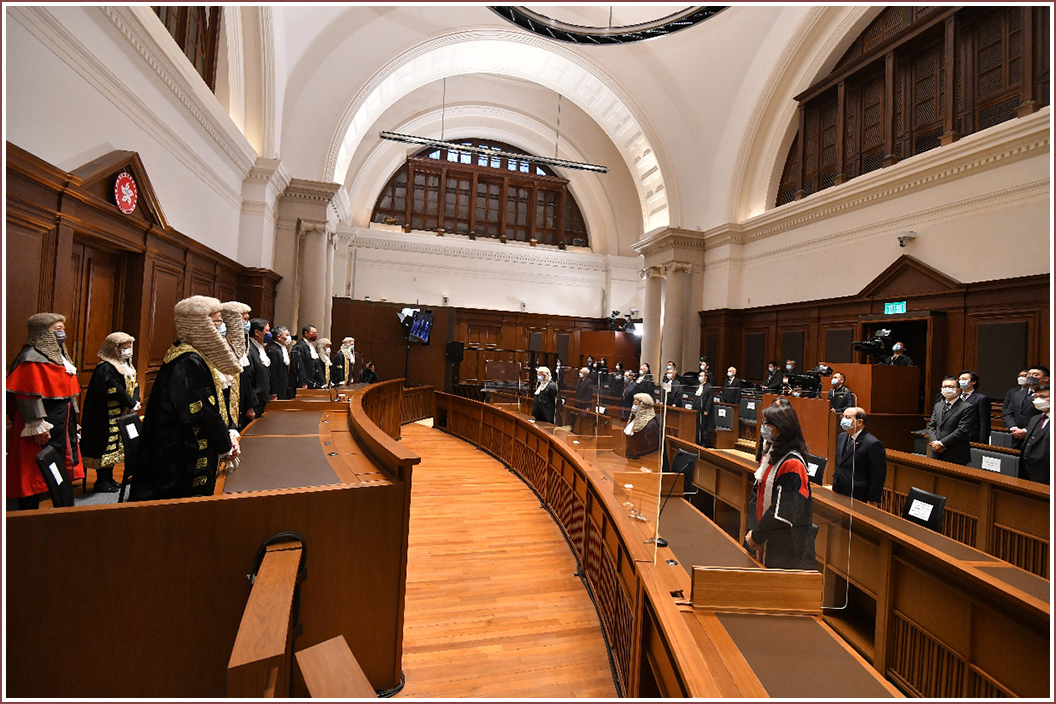 Ceremonial Opening of the Legal Year 2021
Ceremonial Opening of the Legal Year 2021►Appointment of Judges and Judicial Officers
The Hon Mr Justice Andrew CHEUNG, Permanent Judge of the Court of Final Appeal, was sworn in as the Chief Justice of the Court of Final Appeal on 11 January 2021.
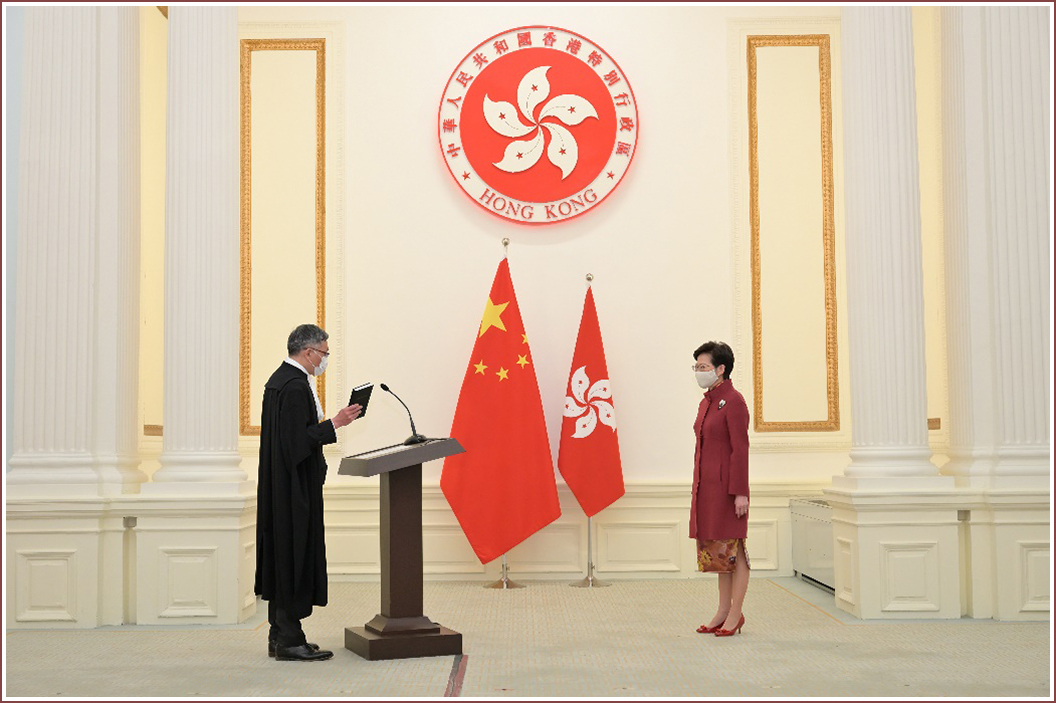 Swearing-in of the Hon Mr Justice Andrew CHEUNG
Swearing-in of the Hon Mr Justice Andrew CHEUNGas the Chief Justice of the Court of Final Appeal
Besides, various judicial appointments took effect in the year of 2021. The Hon Mr Justice Johnson LAM, Vice-President of the Court of Appeal of the High Court, was appointed as a Permanent Judge of the Court of Final Appeal on 30 July 2021.
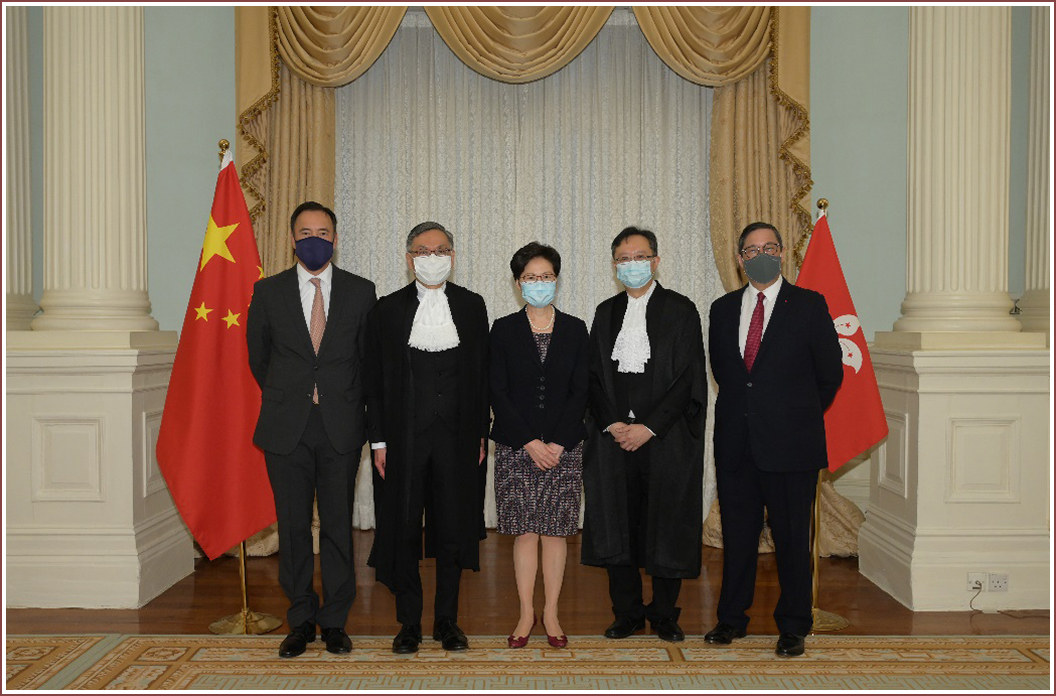 Appointment of the Hon Mr Justice Johnson LAM (second from right)
Appointment of the Hon Mr Justice Johnson LAM (second from right)as a Permanent Judge of the Court of Final Appeal
The Right Hon Lord Patrick HODGE was sworn in as a Non-Permanent Judge from another common law jurisdiction of the Court of Final Appeal on 22 November 2021.
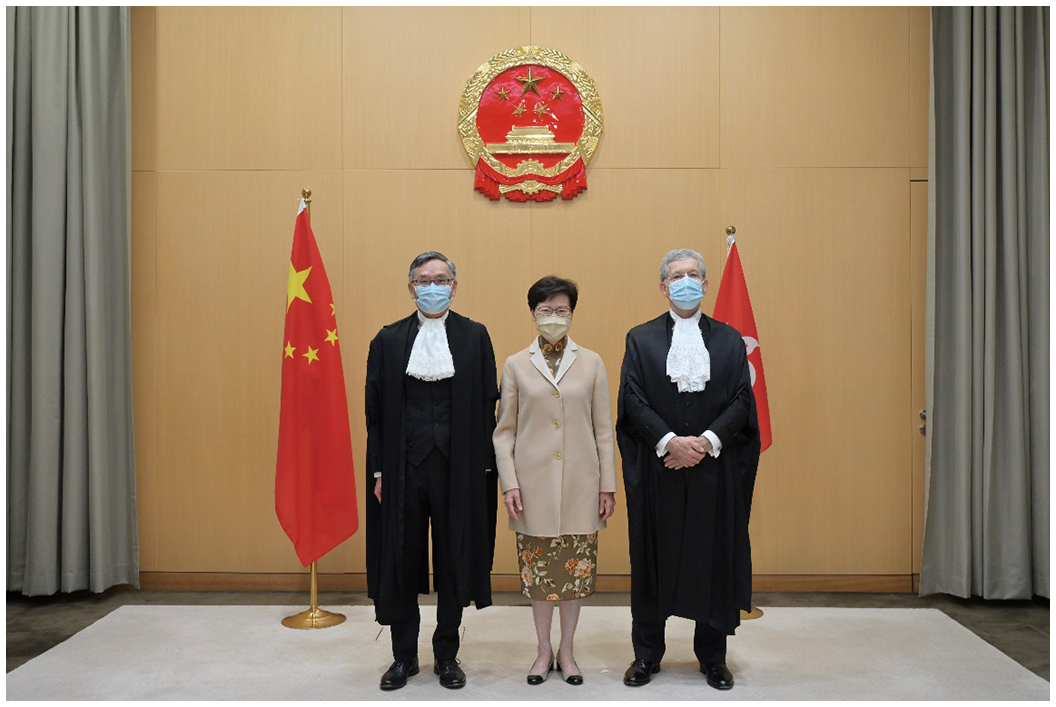 Swearing-in of The Right Hon Lord Patrick HODGE (right) as a
Swearing-in of The Right Hon Lord Patrick HODGE (right) as aNon-Permanent Judge from another common law jurisdiction
of the Court of Final Appeal
The Hon Madam Justice Maggie POON, the Hon Mr Justice Godfrey LAM and the Hon Mr Justice Anderson CHOW, Judges of the Court of First Instance of the High Court, were appointed as Justices of Appeal of the Court of Appeal of the High Court on 9 June 2021.
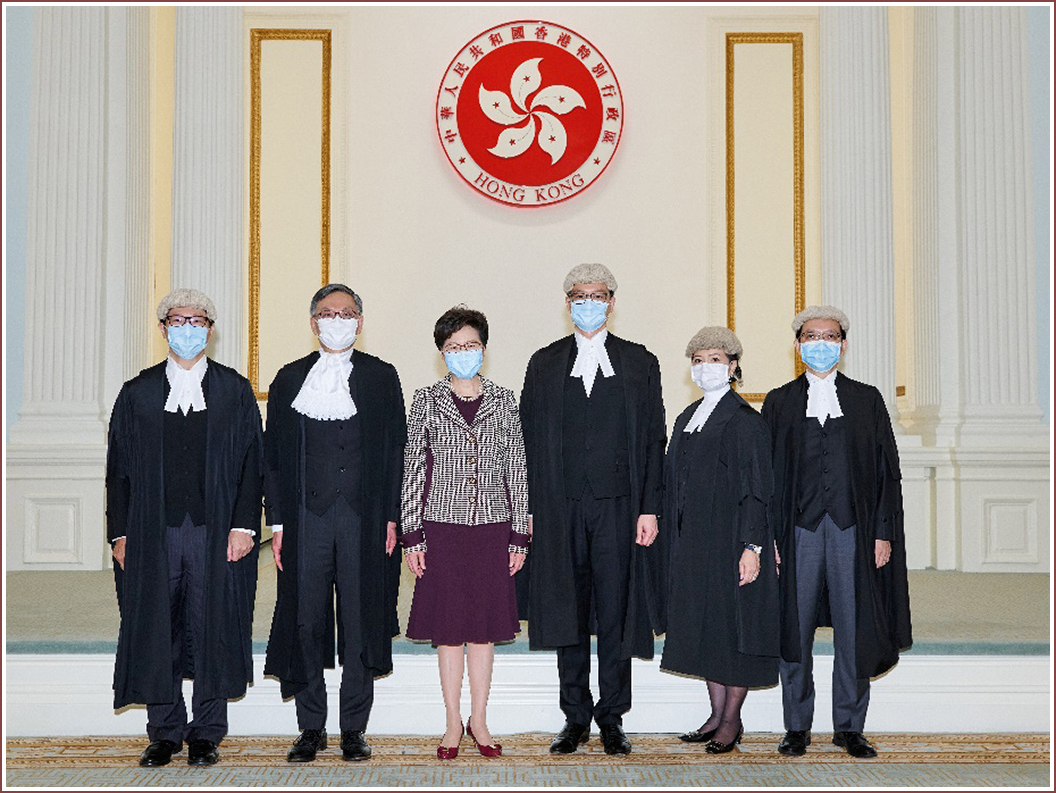 Appointment of the Hon Madam Justice Maggie POON (second from right), the Hon Mr Justice Godfrey LAM (first from right), and the Hon Mr Justice Anderson CHOW (first from left) as Justices of Appeal of the Court of Appeal of the High Court
Appointment of the Hon Madam Justice Maggie POON (second from right), the Hon Mr Justice Godfrey LAM (first from right), and the Hon Mr Justice Anderson CHOW (first from left) as Justices of Appeal of the Court of Appeal of the High Court The Hon Madam Justice Anthea PANG, Judge of the Court of First Instance of the High Court, was appointed as a Justice of Appeal of the Court of Appeal of the High Court on 16 August 2021.
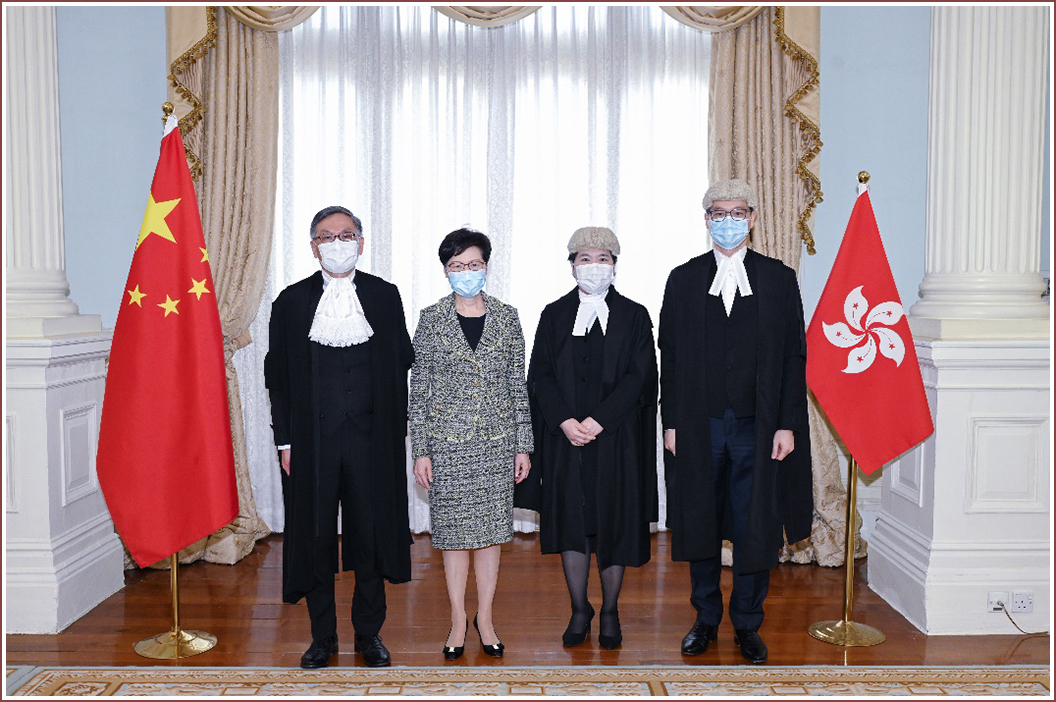 Appointment of the Hon Madam Justice Anthea PANG (second from right) as a
Appointment of the Hon Madam Justice Anthea PANG (second from right) as aJustice of Appeal of the Court of Appeal of the High Court
The Hon Mr Justice Jonathan Russell HARRIS, Judge of the Court of First Instance of the High Court, was appointed as the President of the Competition Tribunal for a term of three years on 16 August 2021.
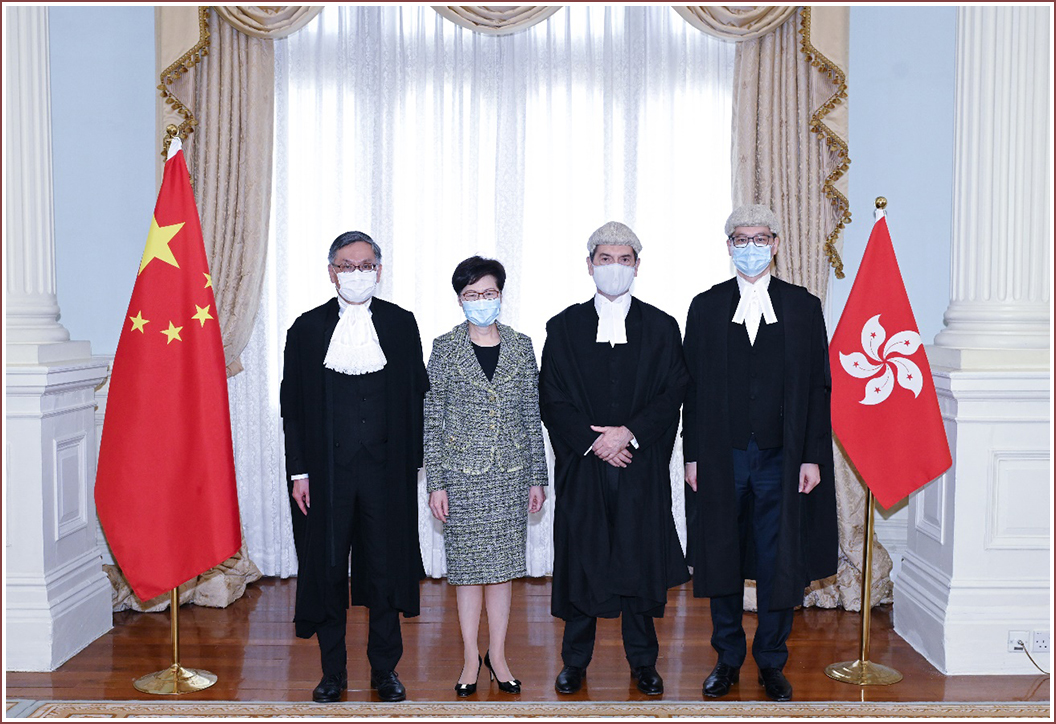 Appointment of the Hon Mr Justice Jonathan Russell HARRIS
Appointment of the Hon Mr Justice Jonathan Russell HARRIS(second from right) as the President, Competition Tribunal
His Honour Judge Johnny CHAN, District Judge, and Miss Anna LAI Yuen-kee, SC were appointed as Judges of the Court of First Instance of the High Court on 26 November 2021.
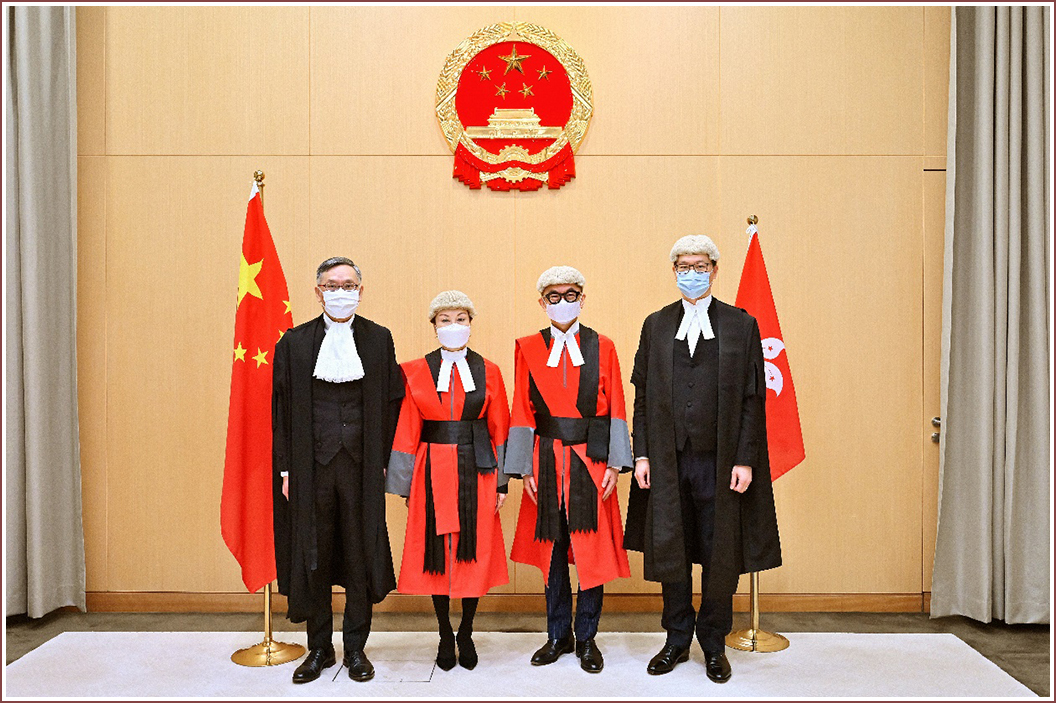 Appointment of His Honour Judge Johnny CHAN (second from right), and
Appointment of His Honour Judge Johnny CHAN (second from right), and Miss Anna LAI Yuen-kee, SC (second from left), as Judges of the
Court of First Instance of the High Court
►Review of complaint mechanism against judicial conduct
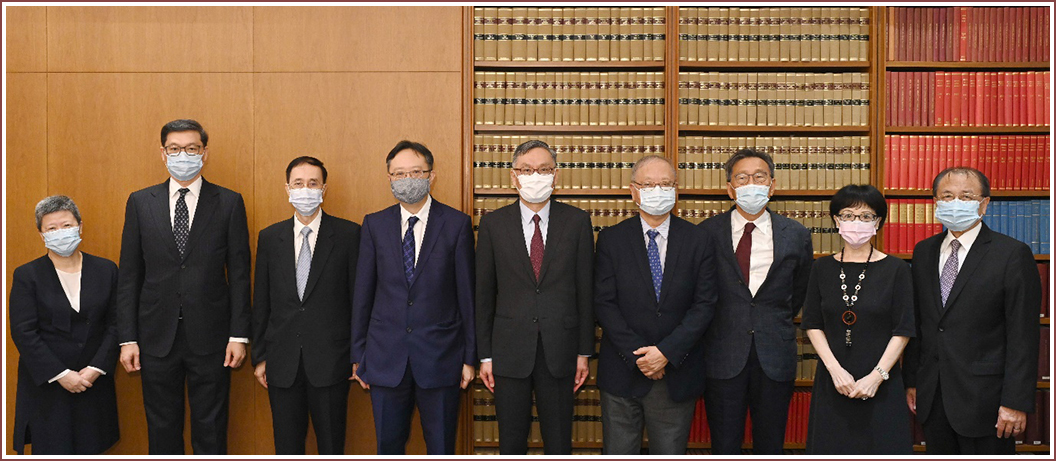 The Hon Chief Justice Andrew CHEUNG, Chairman, (centre) and Members of the
The Hon Chief Justice Andrew CHEUNG, Chairman, (centre) and Members of the Advisory Committee on Complaints against Judicial Conduct
The Judiciary conducted a review on the mechanism for handling complaints against judicial conduct for the purpose of enhancing its transparency and accountability. Arising from this review, a two-tier mechanism for handling complaints against judicial conduct was put in place as from August 2021-
| (a) | Tier 1: | A Panel of Judges (the first-tier) comprising more than one High Court judge will investigate pursuable complaints against judicial conduct which are serious or complex, or have aroused wide public attention; |
| (b) | Tier 2: | All cases investigated by the Panel of judges in Tier 1 will be reviewed by the Advisory Committee on Complaints against Judicial Conduct (“Advisory Committee”) formed to monitor and advise on handling of complaints against judicial conduct. It is chaired by the Chief Justice and comprises senior judges and members from the community with expertise and experience in judicial / professional / public services. |
All pursuable complaints directly related to judicial conduct of judges of the Court of Final Appeal and the Court Leaders will also be handled under the two-tier system, irrespective of whether they are of a serious or minor nature.
The 2021 Annual Report of the Advisory Committee is available at the Judiciary website.
►Judicial training
In 2021, our judges and judicial officers continued to participate in various judicial training activities organized by the Hong Kong Judicial Institute and webinars organized by other organisations. The Hong Kong Judicial Institute organized a new series of seminars on China law to strengthen understanding of the legal and judicial system of the Mainland. The first seminar on the constitution of the People’s Republic of China, the Basic Law and the National Security Law of the Hong Kong Special Administrative Region was conducted in April 2021 whereas the second seminar on the constitutional role of the National People’s Congress and the development of the judicial system of the People’s Republic of China was conducted in December 2021.
►Exchanges with other Jurisdictions
In 2021, our judges and judicial officers continued exchanges with their counterparts in other jurisdictions. However, owing to the COVID-19 pandemic situation, the exchanges were conducted mainly through on-line video conferencing. A gist of these exchanges is set out below.
In March, the Hon Chief Justice Andrew CHEUNG and the Hon Mr Justice Jeremy POON, Chief Judge of the High Court, attended the third meeting of the Standing International Forum of Commercial Courts hosted by the Singapore Supreme Court via video conferencing.
In May, the Hon Chief Justice Andrew CHEUNG; the Hon Mr Justice Jeremy POON, Chief Judge of the High Court; and the Hon Madam Justice Carlye CHU, JA, Justice of Appeal of the Court of Appeal of the High Court, departed to Beijing to meet with the President of the Supreme People's Court, Chief Justice Zhou Qiang, and visited the Intellectual Property Court of the Supreme People’s Court and Beijing Internet Court, and paid courtesy calls to the General Office, the Legislative Affairs Commission and the Hong Kong Special Administrative Region Basic Law Committee of the Standing Committee of the National People’s Congress, the Supreme People’s Procuratorate, the Ministry of Justice and the Hong Kong and Macao Affairs Office of the State Council.
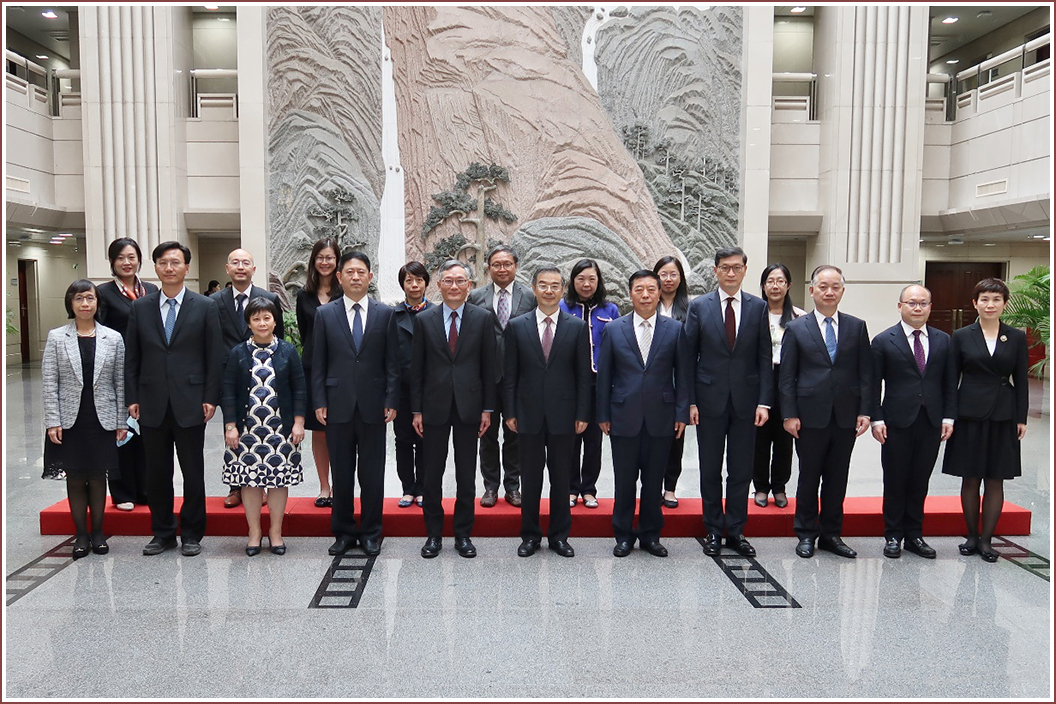 The Judiciary delegation visits the Supreme People’s Court
The Judiciary delegation visits the Supreme People’s Courtand other courts and government authorities in Beijing
In July, the Hon Chief Justice Andrew CHEUNG, the Hon Mr Justice Jeremy POON, Chief Judge of the High Court, and the Hon Madam Justice Carlye CHU, JA, Justice of Appeal of the Court of Appeal of the High Court, attended and delivered speeches at the Sixth Seminar of Senior Judges of Cross-Strait and Hong Kong and Macao through video conferencing.
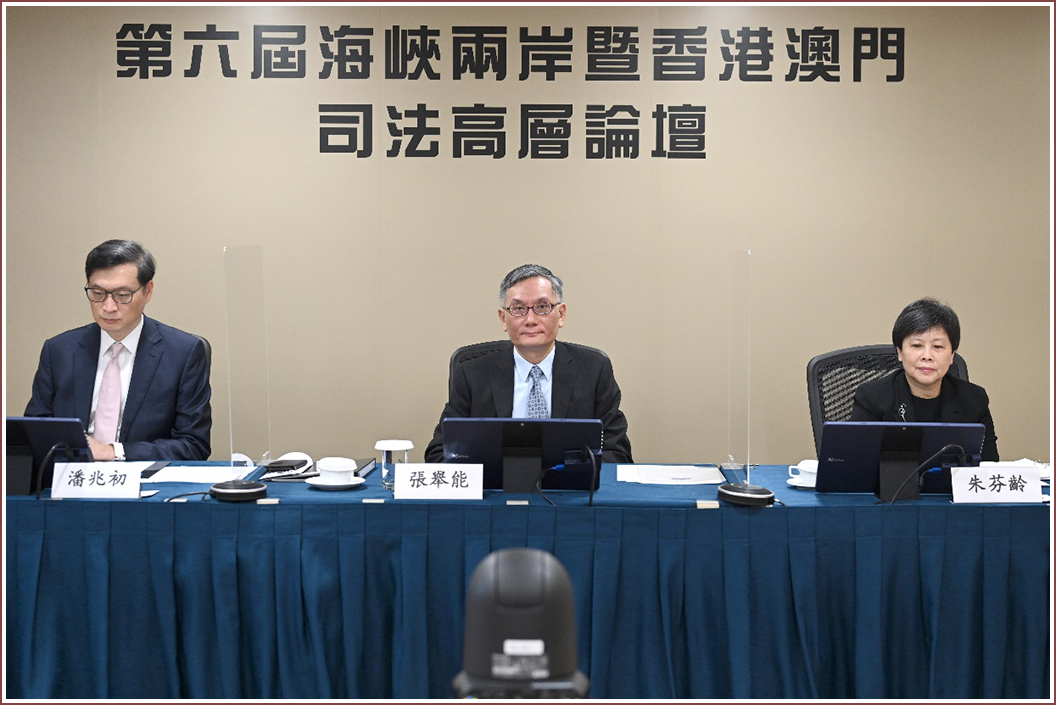 The Hon Chief Justice Andrew CHEUNG (centre), the Hon Mr Justice Jeremy POON (left), Chief Judge of the High Court, and the Hon Madam Justice Carlye CHU, JA (right), Justice of Appeal of the Court of Appeal of the High Court, attend and deliver speeches in the Sixth Seminar of Senior Judges of Cross-Strait and Hong Kong and Macao through video conferencing
The Hon Chief Justice Andrew CHEUNG (centre), the Hon Mr Justice Jeremy POON (left), Chief Judge of the High Court, and the Hon Madam Justice Carlye CHU, JA (right), Justice of Appeal of the Court of Appeal of the High Court, attend and deliver speeches in the Sixth Seminar of Senior Judges of Cross-Strait and Hong Kong and Macao through video conferencingIn the same month, the Hon Mr Justice Jonathan Russell HARRIS, Judge of the Court of First Instance of the High Court, gave a speech at the First Xiamen Cross-Border Insolvency Colloquium in Xiamen via video conferencing.
In September, the Hon Chief Justice Andrew CHEUNG delivered a speech at the Third China Judicial Research Summit Forum and Rule of Law Culture and Judicial Practice Seminar in the form of pre-recorded video.
In October, the Hon Chief Justice Andrew CHEUNG and the Hon Mr Justice Jeremy POON, Chief Judge of the High Court, attended the Maritime Silk Road (Quanzhou) International Forum on Judicial Cooperation via video conferencing. The Hon Mr Justice Jeremy POON also delivered a speech at the Forum.
In November, the Hon Chief Justice Andrew CHEUNG delivered welcome remarks at the Judicial Conference of the Fourth United Nations Commission on International Trade Law ("UNCITRAL") Asia Pacific Judicial Summit 2021. The Hon Mr Justice Jonathan Russell HARRIS, Judge of the Court of First Instance of the High Court, also delivered a speech at the Judicial Conference.
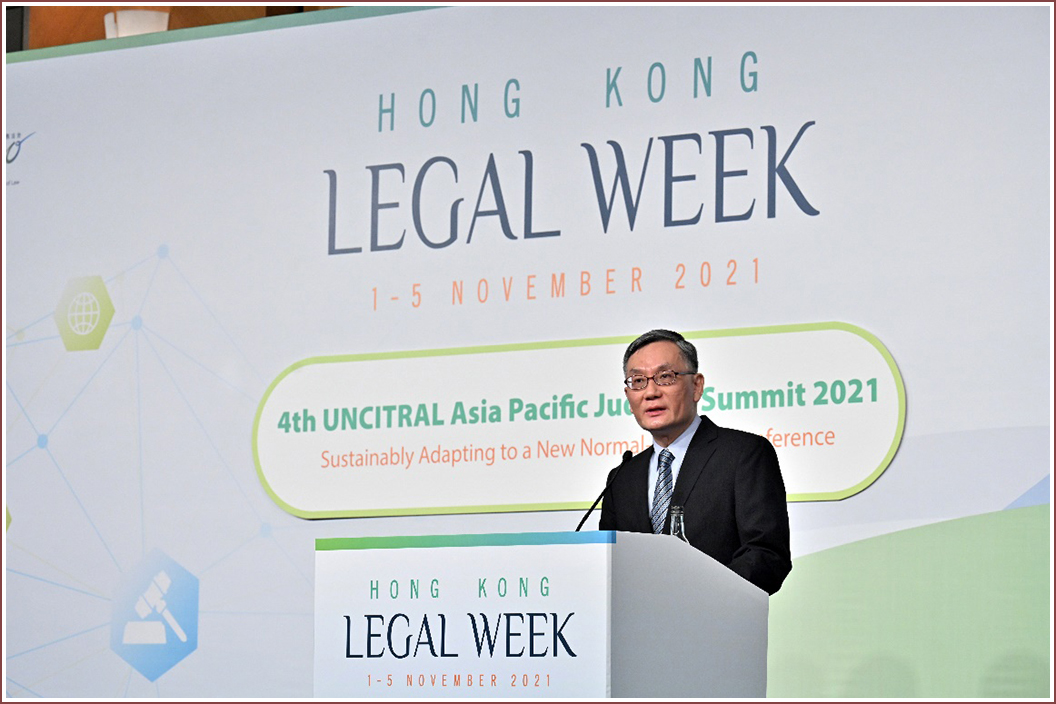 The Hon Chief Justice Andrew CHEUNG delivers the welcome remarks at
The Hon Chief Justice Andrew CHEUNG delivers the welcome remarks atthe Judicial Conference of the 4th UNCITRAL Asia Pacific Judicial Summit 2021
In the same month, the Hon Mr Justice Jeremy POON, Chief Judge of the High Court, addressed the International Criminal Law Conference via a pre-recorded video.
Besides, the Hon Mr Justice Russell Adam COLEMAN, Judge of the Court of First Instance of the High Court, delivered a speech at the legal forum by the Hong Kong and Mainland Legal Professional Association entitled "Maritime Dispute Resolution in Hong Kong: Current and Future".
In addition, the Hon Chief Justice Andrew CHEUNG delivered the opening address at the Rule of Law Signature Engagement Event “SEE – A Journey of Transformation for a Sustainable Future”.
►Meeting challenges on caseloads
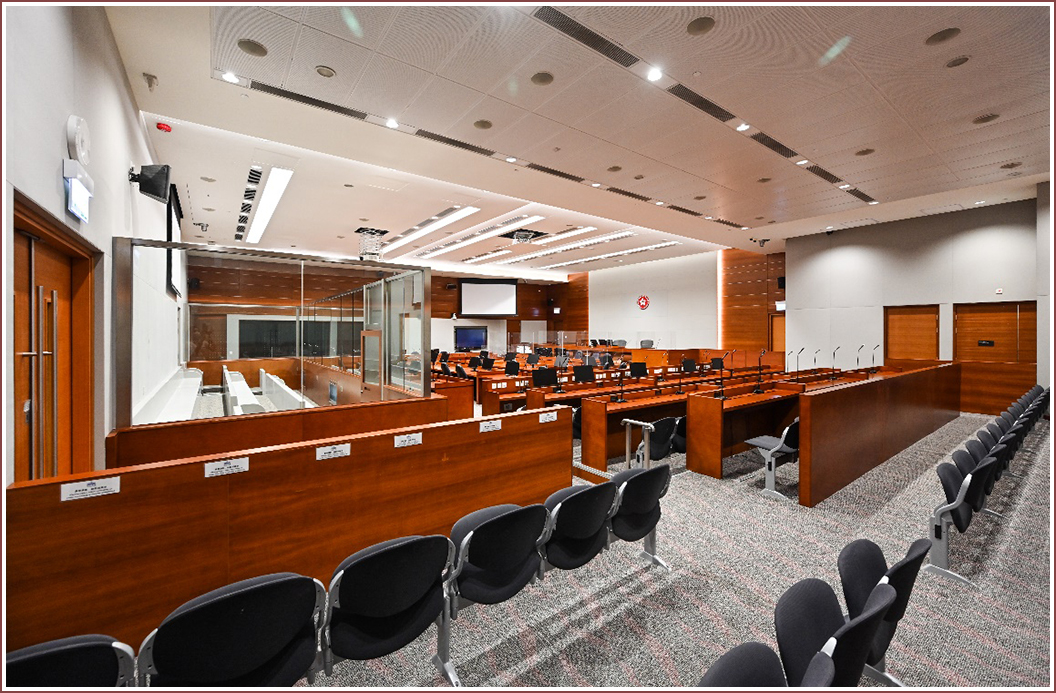 Mega Court at the West Kowloon Magistrates’ Courts
Mega Court at the West Kowloon Magistrates’ Courts after completion of renovation in September 2021
In 2021, the caseloads at the various levels of court generally returned to the levels before the COVID-19 pandemic. On the other hand, the upsurge of cases (especially those relating to social event (“SE”) and national security (“NS”)) at various court levels, and the phenomenal increase in applications for leave to apply for judicial review on non-refoulement claims and related appeals at the High Court and the Court of Final Appeal, have posed unprecedented challenges to the Judiciary.
The Judiciary has been making pro-active and dedicated efforts in coping with the challenges through a series of measures which seek to make the best possible use of available manpower and court facilities to handle the maximum volume of court business. Such measures include-
| (a) | engagement of additional judicial manpower. The Judiciary has launched a new round of recruitment exercises for judges and judicial officers at different levels of court, which are now in progress, with a view to maintaining sufficient judicial manpower to meet operational needs; |
| (b) | more pro-active case management for SE and NS cases, including imposing a tight procedural timetable; |
| (c) | using alternative means of disposal for civil proceedings (including judicial reviews) such as remote hearings and paper disposal where appropriate; and |
| (d) | enhancing the capacity of courtrooms and providing additional court facilities. |
With such pragmatic efforts, we managed to dispose of workload comparable to that in 2019 before the pandemic and generally achieve the target court waiting times for civil cases in 2021. However, owing to the need to re-schedule cases affected by adjustments to court capacity in light of the evolving public health situation, and the impact of the influx of SE and NS cases as mentioned above, the average court waiting times for some case types, mainly for criminal cases, have been affected.
►Enhancement of court facilities and security
In 2021, the Judiciary continued to make dedicated efforts to enhance court facilities in support of an effective judicial system for the administration of justice. To cope with the upsurge of cases which involve multiple defendants or attract wide public and media attention, we have increased the functional capacity of courtrooms by broadcasting court proceedings in adjacent courtrooms in the Wanchai Law Courts Building and the West Kowloon Law Courts Building.
Upon completion of its renovation in September 2021, we have converted the largest courtroom in the West Kowloon Law Courts Building into a mega courtroom that can accommodate as many as 54 defendants (up from 12 previously), 100 legal representatives (up from 18 previously) and 50 family members of the defendants or members of the public.
We also recommissioned in October 2021 the Tsuen Wan Law Courts Building with four courtrooms for hearing District Court cases, so as to free up courtrooms in the District Court in Wanchai for cases that involve many court users.
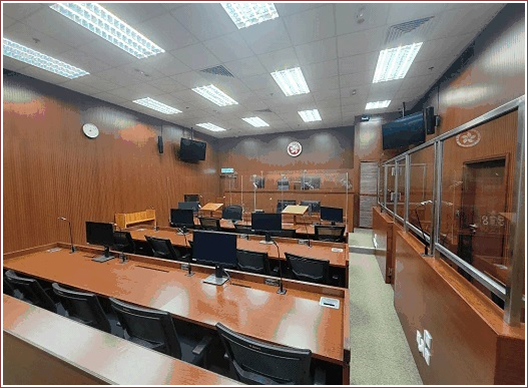 Re-commissioned courtroom at Tsuen Wan Law Courts Building
Re-commissioned courtroom at Tsuen Wan Law Courts BuildingThe year 2021 also saw the Judiciary embarking on various temporary accommodation projects to provide additional court facilities to meet imminent needs. A total of seven courtrooms will be built at the Wanchai Tower and the Revenue Tower, including a mega courtroom which can accommodate as many as 50 defendants, 100 legal representatives and 50 family members or members of the public.
As regards court security, the Judiciary put in place security screening for the Court of Final Appeal Building in July 2021 and the West Kowloon Law Courts Building in December 2021, in addition to security screening already in operation on the court floors of the High Court and the Family Court. As part of our on-going efforts to ensure the safety of Judges, Judicial Officers, Judiciary staff and court users, this measure aims to prevent prohibited items from being brought into court premises. Where practicable and appropriate, the Judiciary would consider introducing security screening in other court premises.
With the higher number of cases which attract much public and media attention, the Judiciary has been taking appropriate crowd management and security measures, including queuing and ticketing arrangements to ensure fair allocation of seats and orderly admission of court users, as well as proportionate deployment of security manpower for keeping order and security in court premises.
►Greater use of technology
The Judiciary has been making on-going efforts to make use of technology to enhance the efficiency of court operations. The impetus was substantially increased following the need for reductions in court capacity during the COVID-19 pandemic. In 2021, we were proceeding at full steam with the implementation of a series of key technology initiatives including e-filing under the Information Technology Strategy Plan (“ITSP”), use of e-bundles at court hearings, remote hearings, e-appointment system as well as digital evidence and exhibits handling system.
Over the past few years, under the ITSP, the Judiciary has been developing by phases an integrated court case management system (“iCMS”) across all levels of court for handling court-related documents and payments through an electronic mode.
To tie in with the forthcoming implementation of the ITSP, the Judiciary has been trying out e-bundle hearings for suitable District Court civil cases since December 2020. The feedback from users has so far been positive. Taking into account the operational experience, the Judiciary will see how best to encourage more e-bundle hearings at various court levels in the near future.
The Judiciary has been promoting the use of more remote hearings for civil proceedings since April 2020. So far, over 1 000 remote hearings (including video-conferencing and phone hearings) have been conducted and the experience has been positive. For criminal proceedings, to remove the legal impediments to remote hearings, the Judiciary is working on the necessary legislative amendments to provide the court with the flexibility to order remote hearings as it sees fit. We plan to introduce the relevant Bill into the Legislative Council as soon as practicable.
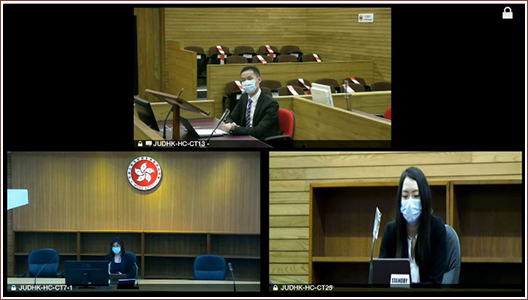 Demonstration of court hearing by video conferencing facilities
Demonstration of court hearing by video conferencing facilitiesTo minimize the need for court users to queue up for registry services, the Judiciary introduced an e-appointment system for selected registry services at the Probate Registry, Family Court and Lands Tribunal in early March 2021. The operating experience has been positive. We are extending the system to cover a few other court services.
The Judiciary will also continue to promote greater use of information technology and/or audio-visual facilities at court buildings so as to meet the increasing need to present and handle digital evidence and exhibits at court hearings, particularly for cases relating to SE and NS cases.

